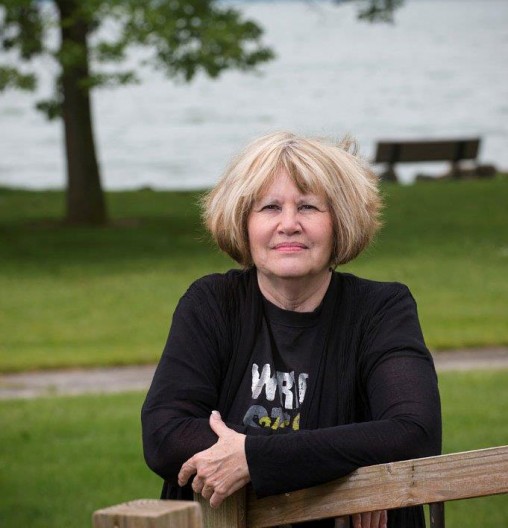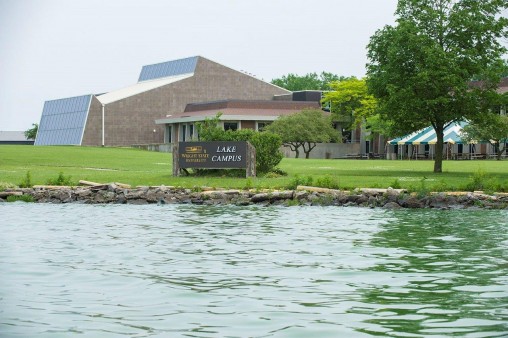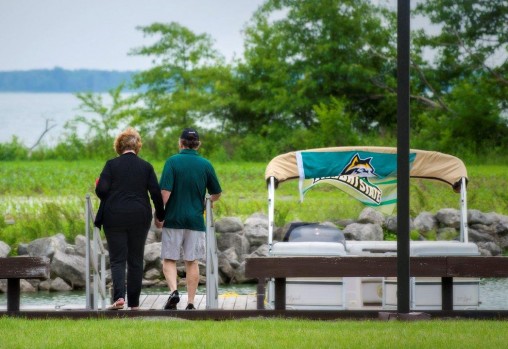
As dean of Wright State’s Lake Campus, Bonnie Mathies oversaw surging enrollments, a nearly doubling of bachelor-degree programs, construction of the first residence halls and the purchase of nearly 40 acres for expansion. Mathies will retire at the end of June. (Photos by Will Jones)
Her first office at Wright State University’s Lake Campus was a picnic table on the rocky shore of Grand Lake St. Marys. She popped open her laptop computer, spread out her papers and held office hours as fish splashed and speedboats purred by.
Today — eight years later — Bonnie Mathies prepares to retire as dean after overseeing a campus that experienced surging enrollments, a nearly doubling of bachelor-degree programs, construction of the first residence halls and the purchase of nearly 40 acres for expansion.
“While you’re in charge of the academic piece, you’re also in charge of everything else,” said Mathies, whose final day is June 30.
When she arrived at the Lake Campus in 2007 as associate dean, Mathies brought with her a world of experience teaching at Wright State’s Dayton Campus as well as at inner city schools in Cleveland and Toledo.
There are many memories. She once delivered a student’s baby on the playground. She also accidentally flattened the dean who would hire her at Wright State.
Mathies quickly won the hearts of the Lake Campus community, which found her to be interested, engaged and willing to contribute.
“The community looks at this as their campus,” she said. “They take great pride in it and see it as an asset. That’s the thing that’s really important.”
On June 8, Celina Mayor Jeffrey Hazel and the City Council issued a proclamation thanking Mathies for her contributions to the campus and the community.
Since Mathies arrived, enrollment has jumped from 845 to 1,147. But the size of the campus still makes it easy for interdisciplinary collaboration.
“My English teacher sits next to my physics teacher who sits next to my graphics teacher. We’re not sitting in silos,” she said. “It’s small enough that everybody knows everybody; everybody knows the students. You have a chance to impact in a much more direct fashion.”
This fall the campus will boast 10 bachelor-degree programs, including ones in engineering, business and nursing. That’s up from seven when Mathies arrived. There are currently more than 150 students in the engineering program and more than 100 involved in various aspects of business programs.
Also flourishing under Mathies’ tenure are the agriculture and food science programs as well as a police academy that graduates an average of 15 students a year. A corrections academy and EMT program may be on the horizon.
Mathies says one of her proudest achievements is further developing the quality and diversity of the faculty on a campus that draws students with a strong work ethic.
“These are hard-working kids,” said Mathies. “Many of them get up early in the morning, do their farm chores, come to school, work a job. Many of them have families.”
It’s only fitting that Mathies would finish her career near water. Her childhood home was Point Place, a Toledo neighborhood that nudges Lake Erie.
“I grew up on water, big water, watching the lake freighters coming in,” she said. “I think I knew how to sail before I could walk. I’ve always wanted to be around water.”

Lake Campus offers 10 bachelor-degree programs, including ones in engineering, business, nursing, education, agriculture and food science, an MBA program and a police academy.
Her father was a power engineer at Toledo Edison, and Mathies enrolled at the University of Toledo in 1960 with an engineering career in mind. But she quickly decided to become a high school biology teacher instead.
After getting her bachelor’s degree, she took a job with Oberlin, Ohio, city schools. She later returned to Toledo, where she taught English, history and biology in the public schools until 1974.
“All of my time teaching in public schools was in urban education,” she said. “You need to be willing to accept surprises because kids who you would think would be the biggest losers in the world turn out to be the biggest winners. Some of the best teachers I’ve ever known and worked with were at those urban schools and they were saints. How they cared for those kids.”
Mathies taught at the Jefferson Center for Vocational Rehabilitation, where she was the curriculum director/designer for such courses as warehousing, food service and dry cleaning. The client/students — ages 16 through the mid-30s — included ones recently released from jail and a mental hospital.
“Finding ways to motivate reluctant and challenged learners prompted me to pursue a degree in instructional technology,” she said.
Mathies was part of a revolution in which technology was finding its way into schools. She used portable video equipment to film summer programs at community centers.
“I delivered a baby on the playground of one of my students,” she said. “She was on a picnic bench, and all I really did was catch the baby. Everybody was fine — except me.”
After Mathies got her Ph.D. in instructional technology at the University of Toledo in 1974, she went to Chicago to market herself for a job at an event hosted by various universities. Roger Iddings, dean of Wright State’s College of Education and Human Services, was there.
“I was rushing out of the elevator and ran right into him,” Mathies recalled. “He’s literally laying on the floor looking up at me saying, ‘And what is it that you do?’”
What Mathies was soon doing was working at Wright State’s College of Education and Human Services in instructional technology. She would go on to be an assistant professor, an associate professor, a full professor, a department chair and an associate dean.
When she retired in 2007, it lasted only a few weeks. She quickly accepted an offer to become associate dean of the Lake Campus.
“There were a lot of curriculum things that needed to be done,” she said. “One thing led to another, and the opportunity came to do the dean piece.”
The Lake Campus was originally part of Ohio Northern University and is actually two years older than Wright State’s Dayton Campus.
And the Lake Campus is still growing. Its new acreage may be used for an advanced manufacturing center, a water quality institute and a collegiate-class baseball field.
But Mathies is ready to hand the baton off to a new leader, incoming Dean Jay Albayyari.
A voracious reader, Mathies is toying with the idea of writing a memoir of sorts after she retires.
“I have stories from my days teaching in inner city schools,” she said. “I’d love to write those up.”
The Bonnie K. Mathies Scholarship has been established to recognize Mathies’ legacy of leadership and giving to Wright State. Gifts in support of the scholarship fund from individual donors (which are tax deductible) may be made by cash, bequests in wills, marketable securities, beneficiary of living trusts, retirement plan assets or life insurance. Cash gifts should be made payable by check to the Western Ohio Educational Foundation (WOEF), and mailed to: Attn. Julie M. Miller, 7600 Lake Campus Drive, 106 Dwyer Hall, Celina, OH 45822-1918.


 Milling around
Milling around  Wright State recognizes Nursing Professor Kim Ringo for advancing international student success
Wright State recognizes Nursing Professor Kim Ringo for advancing international student success  Wright State honors graduating students for distinguished doctoral dissertations
Wright State honors graduating students for distinguished doctoral dissertations  Top 10 Newsroom videos of 2025
Top 10 Newsroom videos of 2025  Museum-quality replica of historic Hawthorn Hill donated to Wright State
Museum-quality replica of historic Hawthorn Hill donated to Wright State 